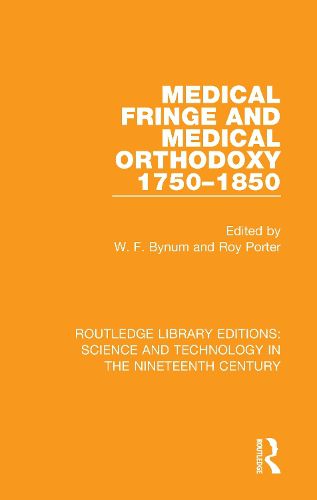Readings Newsletter
Become a Readings Member to make your shopping experience even easier.
Sign in or sign up for free!
You’re not far away from qualifying for FREE standard shipping within Australia
You’ve qualified for FREE standard shipping within Australia
The cart is loading…






First published in 1987. Even as the professionalism of medicine progressed, many sufferers continued to rely on what would now be termed fringe practitioners - quacks, backstreet surgeons, bone-setters, Thomsonian botanists, holists and naturalists. Many types of fringe medicine were popular in particular circles or reflected the political or religious preoccupations of their practitioners. Anti-establishment radicals might favour natural medicine, Christian Scientists would reject the medical aid, Physical Puritans would concentrate on homeopathy, hydropathy and vegetarianism to create health rather than counter disease. Some diseases, particularly venereal ones, allowed practitioners to play unscrupulously on the guilt of their patients. The end of the period saw professionalism establish itself in many areas, for example with the foundation in 1852 of the Pharmaceutical Society, and conflicts of fringe and orthodoxy became the fiercer.
The essays collected in this volume all present new research on this fascinating and diverse period in the history of medicine.
$9.00 standard shipping within Australia
FREE standard shipping within Australia for orders over $100.00
Express & International shipping calculated at checkout
Stock availability can be subject to change without notice. We recommend calling the shop or contacting our online team to check availability of low stock items. Please see our Shopping Online page for more details.
First published in 1987. Even as the professionalism of medicine progressed, many sufferers continued to rely on what would now be termed fringe practitioners - quacks, backstreet surgeons, bone-setters, Thomsonian botanists, holists and naturalists. Many types of fringe medicine were popular in particular circles or reflected the political or religious preoccupations of their practitioners. Anti-establishment radicals might favour natural medicine, Christian Scientists would reject the medical aid, Physical Puritans would concentrate on homeopathy, hydropathy and vegetarianism to create health rather than counter disease. Some diseases, particularly venereal ones, allowed practitioners to play unscrupulously on the guilt of their patients. The end of the period saw professionalism establish itself in many areas, for example with the foundation in 1852 of the Pharmaceutical Society, and conflicts of fringe and orthodoxy became the fiercer.
The essays collected in this volume all present new research on this fascinating and diverse period in the history of medicine.